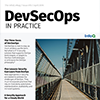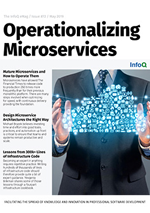SPONSOR AD  In this eBook, you’ll learn best practices for establishing a sound and cost-effective in-memory computing foundation that focuses on the customer experience, supports processes with real-time data management and event processing, and more. Download Now. |
 ODR brings you insights on how to build a great organisation, looking at the evidence and quality of the advice we have available from academia and our thought leaders in our industry. This is a collection of reviews and commentary on the culture and methods being used and promoted across our industry. Topics cover organisational structuring to leadership and team psychology. (Mini-book) |
 In this podcast, Shane Hastie, Lead Editor for Culture & Methods, spoke to Jossie Haines and Aneri Shah of Tile on the culture at Tile, mentoring, diversity & inclusion and retaining women in technology. (Podcast) |
| |
TOP AI, ML & Data Engineering NEWS HEADLINES |
-
-
-
|
 In this article, the author discusses how to collect metrics and achieve anomaly detection from streaming data using Prometheus, Apache Kafka and Apache Cassandra technologies. (Article) |
 Mantas Matelis and Avesh Singh explain how they debugged DeepHeart, a DNN that detects cardiovascular disease from heart rate data. (Presentation with transcript included)
The next QCon is QCon San Francisco, Nov 11-13, 2019. Join us! |
 Emily Samuels and Anil Muppalla discuss the evolution of Spotify's architecture that serves recommendations (playlist, albums, etc) on the Home Tab. (Presentation with transcript included) |
 Dave Russell takes a look at a number of different organizations who are on their big data cybersecurity journey with Apache Metron, covering different use cases they are investigating, the data sources they used, the analytics they performed and in some cases the results they were able to find. (Presentation) |
 Prabhat explores 2D and 3D convolutional architectures for solving pattern classification, regression and segmentation problems in high-energy physics, cosmology and climate science. (Presentation with transcript included) |
 Peter Schafhalter discusses his work with Ray, a distributed execution framework for emerging AI applications, Tune, and Modin. (Presentation with transcript included) |
| |
TOP DevOps NEWS HEADLINES |
-
-
-
-
|
 Andy Courtenay takes a look at migrating an existing infrastructure setup over to Microsoft Azure, the trials, the tribulations, the facepalms and the ultimate freedom to grow it delivered in the end. (Presentation) |
 With this eMag, we present you expert security advice on how to effectively integrate security practices and processes in the software delivery lifecycle, so that everyone from development to security and operations understands and contributes to the overall security of the applications and infrastructure. Download Now. |
SPONSOR AD  Kubernetes was supposed to address the application resource nightmare, but it hasn’t quite worked out that way. But all is not lost – there is a way to effectively manage the performance of orchestrated, containerized applications but a new monitoring approach is required and it begins with complete automation. Learn More. |
| |
| |
TOP Development NEWS HEADLINES |
-
|
 Stephen Klabnik takes a look at some tradeoffs in the design of Rust, and how that makes it more suitable for some kinds of projects than others. In particular, he talks about Rust's "bend the curve" philosophy towards tradeoffs. (Presentation with transcript included) |
 Noel Welsh talks about adopting new programming languages, and looks at the conditions when a language could and should be adopted in a commercial setting. (Presentation with transcript included) |
SPONSOR AD  As the number of microservices at Lyft grew, they faced numerous challenges quickly and accurately monitoring their system, which was now generating exponentially more data than its monolithic predecessor. To address this, Lyft chose to implement [x]PM. Learn why. |
| |
| |
TOP Java NEWS HEADLINES |
-
-
-
|
 Ron Pressler discusses and compares the various techniques of dealing with concurrency and IO in both pure functional (monads, affine types) and imperative programming languages (threads, continuations, monads, async/await), and shows why delimited continuations are a great fit for the imperative style. (Presentation with transcript included) |
SPONSOR AD  Inspired by Spring and Grails, Micronaut is a JVM framework for building scalable applications in Java, Groovy or Kotlin. Download this guide and learn how to build fast, lightweight microservices and serverless apps with the Micronaut Framework. Download Now. |
| |
| |
TOP .NET NEWS HEADLINES |
-
-
-
|
 Don Syme discusses examples of F# code, showing how it relates to language design, functional programming, object programming, and language features, both as an individual and in teams. (Presentation) |
| |
TOP Web Development NEWS HEADLINES |
-
-
-
|
| The World Wide Web Consortium (W3C) and the Fast IDentity Online (FIDO) Alliance recently announced that the Web Authentication (WebAuthn) specification is now an official web standard. WebAuthn allows users to log in via biometrics, mobile devices and/or FIDO security keys, with higher security over passwords alone. (News) |
| |
 This article will explain why UI designers should follow platform specific guidelines while designing for multiple platforms. This can be quite a complex task, due to the variety of constraints and guidelines there are to consider. We propose five easy guidelines to design for multiple platforms focusing on React Native and without missing key usability concerns. (Article) |
| |
TOP Architecture & Design NEWS HEADLINES |
-
|
 This article discusses how to build, manage and maintain APIs with OpenAPI, including some of the most notable features in v. 3.0. (Article) |
 - Scaling Deep Learning to Petaflops and Beyond
- Learning from Chaos: Architecting for Resilience
- What Lies between: the Challenges of Operationalizing Microservices
- And more...
|
| |
TOP Culture & Methods NEWS HEADLINES |
-
-
|
 This article outlines the importance of and proposes meaningful Agile metrics for teams seeking to raise overall performance and whose members seek to continuously self-improve. It emphasizes that team members should democratically agree and manage these metrics. It also advises what to look for in tools that track performance against agreed metrics over time. (Article) |
 The book Risk-First Software Development by Rob Moffat views all of the activities on a software project through the lens of managing risk. It introduces a pattern language to classify different risks, provides suggestions for balancing risks, and explores how software methodologies view risks. (Article) |
 Mairead O'Connor presents how Equal Experts are challenging traditional ways of working; how they question the standard practices of hierarchical management, performance appraisals, approvals, annual budgets, etc. Instead, they are using concepts like iterative, user-centred design, microservices, DevOps, monitoring and alerting to try to create a better place to work. (Presentation with transcript included) |
 Robyn Bergeron examines the ethical principles and practices of open source community architecture that empower contributor influence and participation, drawn from both real-world examples & research. She provides guidance to consumers and creators of open source software on how to influence a community’s culture, as well as how to influence corporate involvement towards good, and not evil. (Presentation with transcript included) |
 Dorothy Graham covers different types and styles of communication, including Virginia Satir’s communication interaction model, and the need for balance in criticism and confidence. (Presentation) |
 Pawel Brodzinski discusses how they adopted change in their organization by rethinking the management models, implementing self-organization in order to improve the performance of their teams, while failing so far to create a workplace that is more humane, fairer, and most importantly, a better fit for the future. (Presentation) |
 Jennifer Riggins offers an explanation of what tech ethics is, and how to create a questioning-based framework to make it an Agile methodology consideration. (Presentation) |
 Ryan Behrman presents a recipe for Agile transformation in 10 steps. (Presentation) |






























